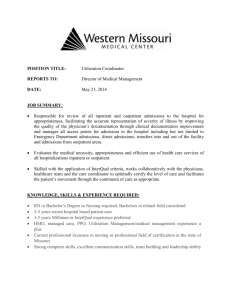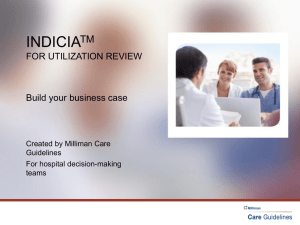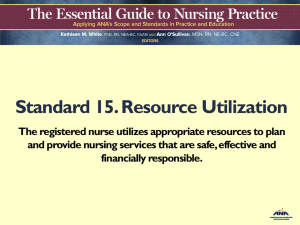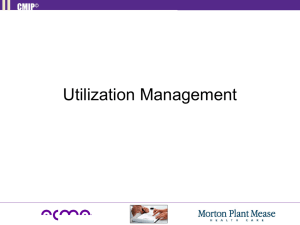Hillsdale Community Health Center
advertisement
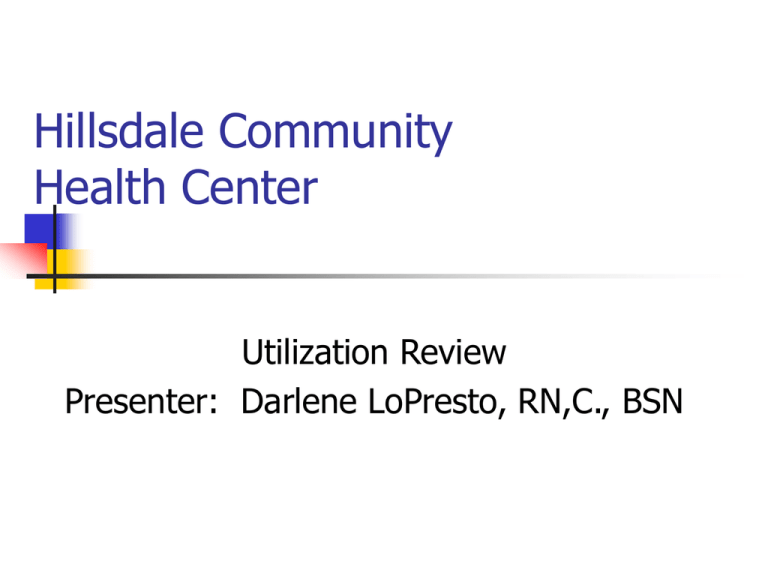
Hillsdale Community Health Center Utilization Review Presenter: Darlene LoPresto, RN,C., BSN Mission Statement The Utilization Review Department is committed to assuring appropriate allocation of hospital resources through the provision of quality patient care in the most cost effective manner. Vision Statement The Utilization Review Department will adhere to the following: Determine medical necessity and appropriate level of care for each admission Capture authorization and certification resulting in payment by third party payors Vision Statement cont. Screen and report quality of care issues Assure timely and cost effective care by managing appropriate utilization of resources Collect and present data showing utilization of resources and factors that impact cost effectiveness and quality of care Initial Utilization Review All in-patient admissions, including elective, urgent, and emergent will be reviewed to ensure that the admission meets InterQual Severity of Illness and Intensity of Service criterion for the acute in-patient setting. Initial Utilization Review Admissions will be reviewed to ensure: Each admission meets InterQual admission criterion Appropriate setting for the services rendered (ICU, CCU, tertiary facility, etc) Potential patterns of ineffective resource utilization Professional services furnished including drugs & biologicals Utilization Review See sample of Utilization Review worksheet for documentation Utilization Review U.R staff will perform telephonic prenotification procedures as deemed by the insurance payor within the first business day following the admission (Commercial, managed medicaid, BCBS). Some insurance companies require daily clinical updates to obtain payment approval Utilization Review The U.R. Director will be notified if any admission does not meet InterQual criterion. A discussion is held with the admitting physician and then referred to the Physician Advisor (UR Committee)for review and determination of over-ride or denial of patient admission (change to 23 hr stay). Concurrent Review Concurrent reviews will occur on those patients that remain in the hospital after their initial review to determine the appropriate level of care at a minimum of every two days. Concurrent reviews help determine whether the patient requires continued hospitalization and meets InterQual Intensity of Service criterion. Concurrent Reviews Current signs & symptoms Physician & nursing documentation Physician orders Results of labs, radiology, and/or surgical procedures Appropriateness and timeliness of tests/procedures/consults Environmental or social issues which may delay timely discharge Patient response or lack of response to treatment Readmission Review Readmission review will occur on those patients that are readmitted within 15 days of the previous admission (BCBS patients are reviewed within 14 days of previous admission) The current and previous medical records will be reviewed to determine whether or not the medical records should be combined for one admission payment. Readmission Review The following three categories are assessed for possible combination of admissions: Premature discharge: patient is discharged without discharge screens being met; including clinical and level of care critieron Planned: Patient is discharged from hospital with a documented plan to readmit within 14-15 days for additional services. Continuation of Care: Patient is discharged before All medical treatment is rendered, and care during the second admission should have occurred during the first admission. 23 hour admissions: Goals: To provide a safe alternative to emergency department holds To provide the opportunity for the physician to observe the patient’s status to determine whether or not their condition warrants inpatient admission (or to indicate failed observation/outpatient treatment). To increase approvals for the inpatient admissions that meet InterQual criteria for the patient’s presenting signs & symptoms 23 hour Admissions Physician documentation of observations & treatments are critical during this timeframe to effectively warrant the need for inpatient hospitalization The Utilization Review analyst will review with the physician whether the patient meets inpatient or 23 hour cirteria. Any 23 hour admissions that are changed to a full admit and do not meet InterQual Admission criteria will be reviewed by the UR Physician Advisor (UR Committee), who will follow up with the admitting physician. 23 hour Admissions InterQual Criteria Examples Denial of Conflicts Hospital Issued Notice of NonCoverage Denial of Conflicts cont. Notification of Hospital Discharge Appeal Rights (‘Important Notice from Medicare’) Denial of Conflict cont. Expedited Review Request by Medicare Beneficiaries All Appeals are sent to: MPRO Michigan Peer Review Organization 40600 Ann Arbor Rd Suite 200 Plymouth, MI 48170 (800) 365-5899 Utlization Review Committee Bylaws of the Medical Staff Description of the UR Committee Length of Stay and DRG The hospital plans its fiscal budget according to DRG (Diagnostic Related Group) length of stay. Our current monthly budget for LOS is 3.0 Example: COPD has a DRG of 4.4 days Each decimal point past 3.0 costs the hospital $75,000 Goal is to maintain the DRG LOS for the diagnosis which in turn will give us our average LOS of 3.0 Physician documentation is paramont for going beyond a diagnotic DRG LOS Questions/Comments Thank you for your participation!
